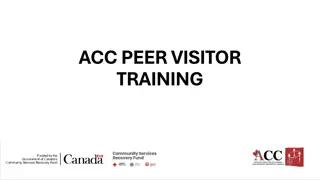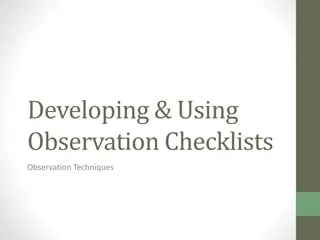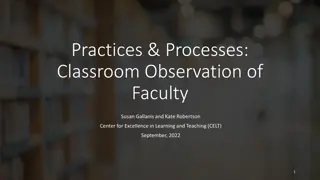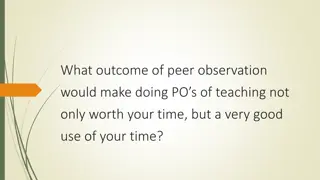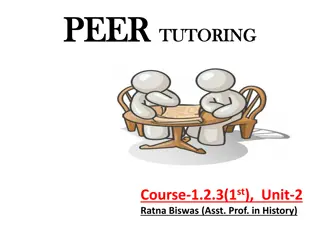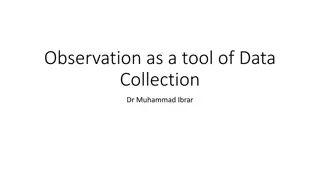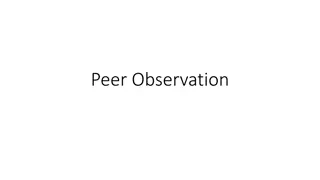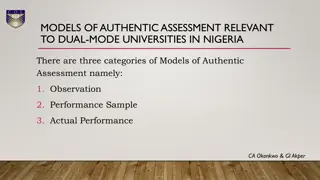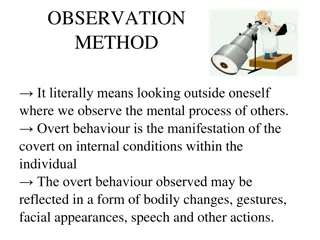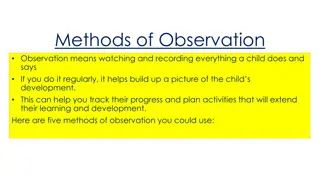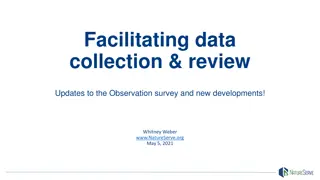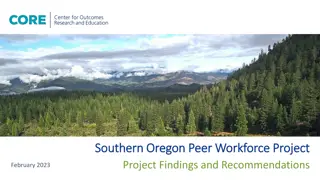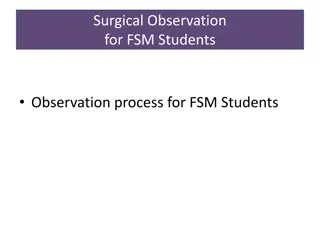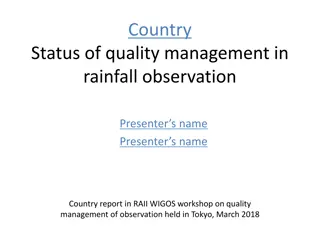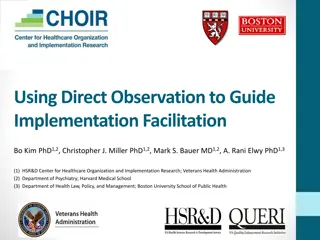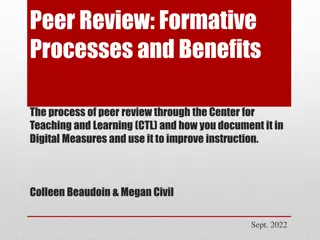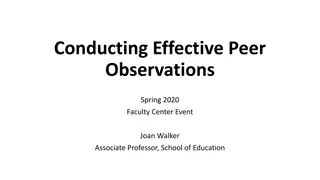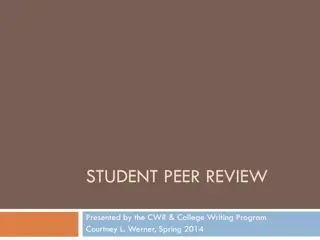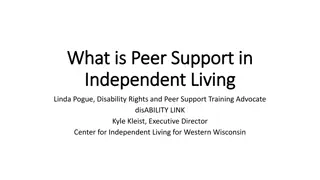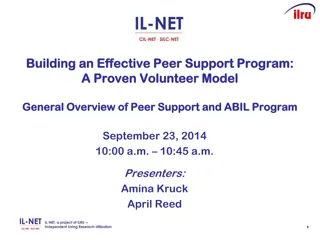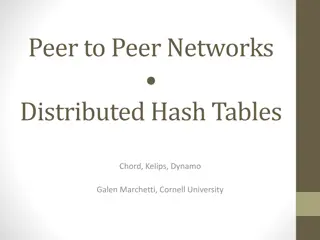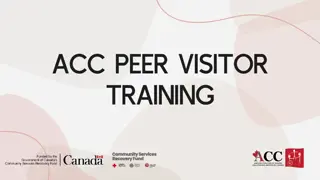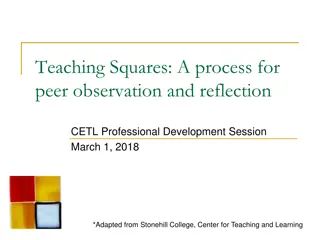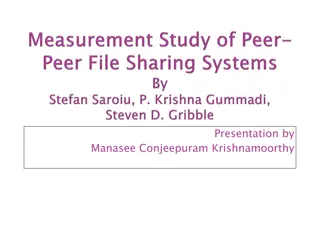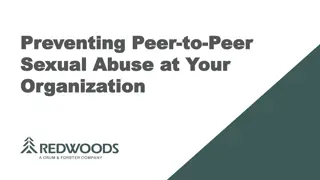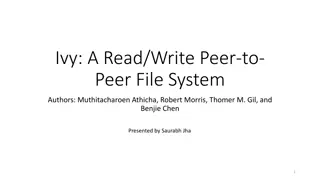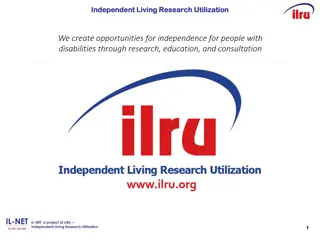Peer Support Across the Lifespan: A Comprehensive Guide
Exploring the impact of peer support at various stages of life, this comprehensive guide delves into the evolving role of advocates, the types of peer support available, and the significance of youth involvement. From adolescence to older adulthood, peer support remains flexible, transformative, and
1 views • 21 slides
Insights into Financial Services, Banking, and Stocks Innovations
Explore the latest trends in financial services including contactless payments, mobile banking, security systems, peer-to-peer lending, and the impact of Bitcoin in the industry. Discover how technology is transforming the way we manage finances and investments. From convenient mobile banking soluti
0 views • 18 slides
Teaching Observation Process and Best Practices
Explore the teaching observation process with a focus on fostering faculty success and improving teaching practices. Learn about pre-observation meetings, separating observation from evaluation, and utilizing observations to spark dialogue about effective teaching. Access resources such as the Teach
7 views • 20 slides
Peer Support and Visitor Training for Amputees
Explore the world of peer support and visitor training for individuals who have undergone amputations. Understand the benefits of peer support, the role of peer visitors, and engage in group discussions to enhance knowledge and skills in providing meaningful support. Dive into role-playing activitie
0 views • 90 slides
Using Observation Checklists for Effective Research
Observation checklists are valuable tools in research, allowing for quick and systematic data collection while maintaining objectivity. They help researchers focus, remain objective, and ensure thorough data coverage. Specificity in checklist design is crucial for capturing nuanced behaviors. The ch
0 views • 6 slides
Classroom Observation Practices and Processes at CELT
Classroom observation practices and processes at the Center for Excellence in Learning and Teaching (CELT) involve faculty observations, formative and summative evaluations, and the utilization of the Teaching Observation Form. Observations are conducted by various stakeholders to promote effective
1 views • 16 slides
Enhancing Teaching Through Effective Peer Observation Practices
Peer observation of teaching can be highly beneficial when conducted with specific outcomes in mind. Key elements include scheduling observations strategically, establishing departmental best practices, distinguishing between summative and formative reviews, and adhering to institutional policies. T
0 views • 23 slides
Understanding Peer Tutoring: Definition, Types, and Objectives
Peer tutoring is a collaborative learning approach where students of similar or different ages help each other learn. It involves one student instructing another in a subject where the former is knowledgeable and the latter is not. The primary objectives of peer tutoring include enhancing students'
1 views • 12 slides
Understanding Observation as a Data Collection Tool in Behavioral Science
Observation method serves as a crucial tool for data collection in behavioral science, enabling researchers to systematically record and analyze observable phenomena. This method involves recording behavior patterns without direct interaction, providing in-depth insights into natural settings and in
0 views • 12 slides
Enhancing Peer Observation for Professional Development
Explore the purposes and challenges of peer observation, learn strategies to implement effective peer feedback, bridge institutional requirements with developmental goals, and foster a culture of collaboration in teaching practices. Discover a framework for constructive dialogue, evaluate learning e
2 views • 12 slides
Insights from Surveys on Peer Review & Peer Feedback in Scholarly Communication
Results from surveys on peer review and peer feedback provide valuable insights into the demographics, general attitudes, and major challenges faced in scholarly communication. The data reveals respondent demographics, overall satisfaction with peer review systems, and prevalent problems in current
0 views • 13 slides
Psychometric Tests Overview: MAP, SPM, Observation Test
Explore three different psychometric tests - Multi-Dimensional Assessment of Personality (MAP), Standard Progressive Matrices (SPM), and Observation Test. MAP assesses personality dimensions, SPM measures intelligence through abstract reasoning, and the Observation Test evaluates your power of obser
4 views • 14 slides
Models of Authentic Assessment in Dual-Mode Universities in Nigeria
Three categories of Models of Authentic Assessment relevant to dual-mode universities in Nigeria include Observation, Performance Sample, and Actual Performance. The Observation model involves assessing students based on performance and attitude, the Performance Sample model evaluates tangible resul
0 views • 27 slides
Understanding Observation Methods in Psychology
Observation method in psychology involves looking outside oneself to observe the mental processes of others. It includes types such as participant and non-participant observation, structured and unstructured observation. Steps in the process include planning, execution, interpretation, and reporting
2 views • 10 slides
Effective Child Development Observation Methods
Observing children is a crucial aspect of tracking their development. Naturalistic Observation, Event Sampling, Snapshot Observation, and Non-Participative Observation are effective methods outlined in the content. These methods help in capturing a child's behavior, interactions, and progress, aidin
3 views • 7 slides
Enhancements to Observation Survey for Effective Data Collection and Review
Leveraging the latest updates in Observation Survey v1.4, this tool facilitates the collection and review of observation data seamlessly. From utilizing standardized data models to enabling live data generation, this survey empowers users to create and manage Environmental Observations (EOs) efficie
0 views • 12 slides
Understanding Distributed Hash Tables in Peer-to-Peer Systems
Distributed Hash Tables (DHTs) are a fundamental component in organizing nodes in peer-to-peer networks. By using hash functions to assign keys to peers, DHTs enable efficient storage and retrieval of objects. Peers in a DHT are responsible for storing and managing key-value pairs, with each key bei
0 views • 31 slides
Southern Oregon Peer Workforce Project Findings and Recommendations
The Southern Oregon Peer Workforce Project conducted research to enhance peer training and supervision programs. The project aimed to foster shared learning among peer support services in Southern Oregon, leading to improved advocacy and evaluation capabilities. The findings and recommendations from
0 views • 42 slides
Surgical Observation Process for FSM Students
This detailed guide outlines the surgical observation process for FSM students, including obtaining approval, contacting ORSC, identifying surgeons/assistants, and completing necessary forms. Scrub attire requirements, contact information for various departments, and additional notes for smooth obse
2 views • 5 slides
Challenges and Solutions in Rainfall Observation: A Comprehensive Overview
This report delves into the challenges faced in rainfall observation, such as lack of skilled experts, absence of real-time reporting, and limited knowledge in quality control. It also covers topics like annual rainfall maps, major rainfall-related disasters, rain gauge networks, and applications of
1 views • 8 slides
Peer Learning Benefits and Practical Applications in Librarianship
Exploring the benefits of peer-to-peer learning in librarianship through real-life scenarios and research projects. Peer training enhances understanding, encourages questions, and provides a supportive environment for skill development. The MLA research project exemplifies collaborative learning wit
0 views • 21 slides
Utilizing Direct Observation for Implementation Facilitation
This article discusses the importance of direct observation in guiding implementation facilitation processes. It emphasizes the value of formative evaluation to identify influences on implementation effectiveness. By thoroughly collecting data through mixed-methods direct observation, facilitators c
1 views • 29 slides
Professional Peer Supervision: Enhancing Support and Development for the Peer Workforce
Chris Grumley, a Specialist Peer Worker at Flourish Australia, presents the importance of Professional Peer Supervision in supporting and developing the Peer Workforce. The benefits include critical reflection, accountability, and nurturing expertise. The focus is on utilizing Lived Experience, well
0 views • 14 slides
Enhancing Teaching Through CTL Peer Review Process
Explore the formative processes and benefits of peer review at the Center for Teaching and Learning (CTL). The article delves into the voluntary nature of peer review at UT, outlining its three components and the step-by-step process from pre-observation to post-observation conferences. Discover how
0 views • 21 slides
Global Peer Review Activities and Future Plans Overview
This document highlights the recent peer review activities conducted by the Subcommittee on Peer Review, focusing on the accomplishments and upcoming plans for enhancing peer review processes. It includes insights from the Global Flyer Survey, training programs, and the development of guidelines, al
0 views • 3 slides
Creating a Purposeful Peer Job: Essential Tips and Strategies
Gain insights into creating a meaningful peer job through understanding the role, job responsibilities, and effective hiring practices. Explore the difference between peer role and peer job, along with valuable tips for a successful hire in peer support positions. Enhance your knowledge to develop a
0 views • 21 slides
Effective Peer Observation Strategies for Professional Development
Explore the significance of peer observation in academia, including reasons for conducting it, challenges involved, and a detailed breakdown of the three phases - Before, During, and After observation. Learn about tools for capturing observations, arranging debriefing sessions, and enhancing teachin
0 views • 17 slides
Enhancing Peer Review Practices in College Writing Programs
Explore the significance of peer review in college writing instruction, emphasizing the practicality, foundational pedagogies from the 1970s-1990s, and strategies to improve peer review processes. Learn how to set a foundation, make peer reviews more social using writing groups and online platforms,
0 views • 5 slides
Peer Support in Independent Living: Importance, Types, Training, and COVID Impact
Peer support in independent living plays a crucial role in connecting individuals with disabilities, providing a way for them to connect, share experiences, and build a supportive community. It is considered a core service that can be offered through individual or group settings. Training programs a
0 views • 9 slides
Building an Effective Peer Support Program: Overview and Regulations
The presentation provides insights into building an effective peer support program, encompassing the definition of peer support, regulations governing peer support, and the role of volunteer peer mentors. It emphasizes the importance of peer relationships and role models in promoting independence am
0 views • 24 slides
Evolution of Peer-to-Peer Networks and Distributed Hash Tables
Peer-to-peer networks and distributed hash tables have evolved significantly over the years, from the early days of ARPANET to the emergence of decentralized systems like Chord, Kelips, and Dynamo. This evolution has brought about a shift towards greater decentralization, improved scalability, and e
0 views • 39 slides
Peer Support and Visitor Training Workshop
Explore the importance of peer support in the amputation process through engaging discussions and role-playing activities. Discover the short-term and long-term benefits of peer support, understand the attributes and benefits it offers, and delve into when and where peer visiting can be most impactf
0 views • 93 slides
Uncovering Fabricated Data in Stem Cell Research: The Haruko Obokata Scandal
Haruko Obokata, a promising stem cell researcher in Japan, faced allegations of data fabrication, leading to a significant research scandal. Post-publication peer review platforms like PubPeer, PubMed Commons, F1000 Research, and ResearchGate Open Review play vital roles in detecting and addressing
0 views • 11 slides
Peer Observation and Reflection in Teaching Squares
Teaching Squares is a collaborative process for reciprocal peer observation and reflection in the context of professional development. It involves non-evaluative steps such as an initial meeting, three classroom visits, and a square share discussion. Best practices include creating cross-disciplinar
0 views • 6 slides
Local MAC Address Assignment Protocol (LAAP) and 802.1CQ
The Local MAC Address Assignment Protocol (LAAP) in conjunction with 802.1CQ specifies protocols and procedures for locally unique assignment of MAC addresses in IEEE 802 networks. LAAP operates in two modes - Server Mode and Peer-to-Peer Mode, ensuring efficient allocation of MAC addresses while av
0 views • 15 slides
Evaluating Peer-Peer Systems in Distributed Architectures
Abundant research is being conducted in peer-peer architectures, focusing on evaluating peers to understand system effectiveness. The lack of such assessments led to a detailed study on organizing peers in decentralized systems like Napster and Gnutella. The process involved crawling systems to meas
0 views • 43 slides
Mass Observation in Britain: A Tool for Public Understanding in the Late 1930s
In the late 1930s, Mass Observation played a vital role in understanding public opinion in Britain amidst international crises like the Munich Crisis. Through recruiting volunteers to provide personal observations and conducting focused surveys, Mass Observation aimed to give voice to ordinary peopl
0 views • 8 slides
Preventing Peer-to-Peer Sexual Abuse in Organizations
Learn how to identify, prevent, and respond to peer-to-peer sexual abuse within your organization. Understand what peer abuse entails, recognize warning signs, and address power imbalances that may lead to such incidents. The content highlights the reality of peer-to-peer abuse, debunks common misco
3 views • 23 slides
Ivy: A Read/Write Peer-to-Peer File System Overview
Introduction to Ivy, a read/write peer-to-peer file system designed to enable easy storage and access of remote files in a distributed manner. The presentation covers the motivation for peer-to-peer distributed file systems, challenges in designing such systems, and how Ivy addresses trust issues an
0 views • 17 slides
Peer Mentor Program in Independent Living Research
Integrating CIL Core Services for a Holistic Consumer Experience includes implementing or strengthening effective core services in peer support through examples like Ability360's program. The definition of a volunteer peer mentor program is explained, highlighting its importance in providing role mo
0 views • 44 slides



